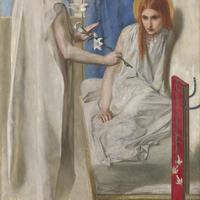"Ecce Ancilla Domini" (The Annunciation)_Dante Gabriel Rossetti
Item
- Description
- Inspired by the work of early Renaissance artists such as Botticelli (1445-1510) and Fra Angelico (1387-1455), Rossetti sought in this work a radical reinterpretation of the Annunciation. Traditionally the Virgin was depicted in studious contemplation, reading a missal at a prie-dieu; but here Rossetti shows her rising awkwardly from a low bed, as if disturbed from sleep, while the Angel Gabriel presents her with a white lily. Both figures are dressed in white, a symbol of the virgin's purity, and the angel's role as the messenger of god is emphasised by the small white dove hovering beside him, signifying the presence of the holy spirit. Rossetti used several sitters for his figures, including his brother, William Michael, for the Angel and his sister, Christina, for the Virgin. A companion piece showing the Virgin's death was planned, but never begun. This partly explains the tall narrow shape of the picture, which was intended as part of a diptych. Rossetti intentionally restricted his palette almost entirely to white and the three primaries. The colour blue, symbolic of heaven, is traditionally associated with the Virgin and red symbolises the blood of Christ. Rossetti even sought a red-haired model for the Virgin's head. The composition is carefully thought out: the vertical division of space, made by the blue hanging and the edge of the bed, falls almost on the Golden Section. The dove and the lily, with one bud still to break, move across this division and are the instruments of conception. Rossetti has written the date, 'March', at the bottom of the canvas, perhaps to signify the month in which the Feast of the Annunciation is held. The original frame was also inscribed with Latin mottoes, copied from a brass rubbing owned by a fellow member of the Pre-Raphaelite Brotherhood, F.G. Stephens (1828-1907).
- Creator
- Dante Gabriel Rossetti (England, London, 1828–1882)
- Date Created
- 1849-1850
- Identifier
- Flower010
- Rights
- The picture was exhibited at the National Institution in 1850 and heavily criticised, partly for its didacticism. The critic for the Athenaeum wrote that it was 'a work evidently thrust by the artist into the eye of the spectator more with the presumption of a teacher than in the modesty of a hopeful and true aspiration after excellence.' (20 April 1850, p.424) Rossetti vowed never to exhibit in public again, but he continued to work on his picture until 1853, when it was sold to Francis McCracken of Belfast, an early patron of the Pre-Raphaelites, for £50.
- Tate Gallery, London
- Source
- Tate Gallery, London
- Item sets
- Flowers in Paintings
- Media
 Ecce Ancilla Domini
Ecce Ancilla Domini
